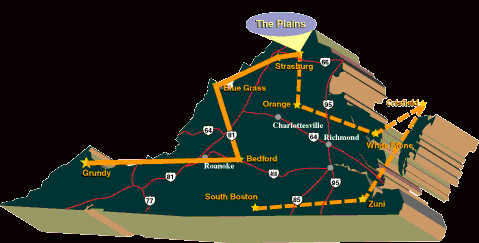 Download
in PDF Format
Download
in PDF Format
�Down Home In The Plains"
Don't
blink when you're passing through, or you just might miss this gem of a
community in Northern Virginia.
Scenic vistas,
hospitable townsfolk and traditional values define this northern Shenandoah
Valley community.
|
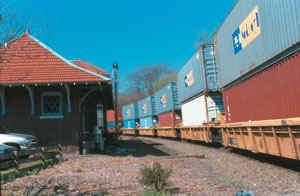
Eighteen
times a day a train rumbles through The Plains. The old railroad
station is now known as Railroad Arts, a small cluster of artist
studios. |
The Plains is
the proverbial town you might miss if you blinked while passing through. It
is barely a town at all, by size standards, just a square-mile plot midway
between Warrenton and Middleburg in rural Fauquier County.
But you�d miss a lot if you didn�t stop in The
Plains for a closer look. Like a child turning over stones in a bubbling
creek to see what treasures lie beneath, you can find much below the surface
of this little gem of a town.
Within an hour of Washington, DC, many people pass
through The Plains each year on their way to the fall foliage or to one of
the many steeplechase races in the Piedmont. Except for the regular roar of
a passing train, it�s a quiet town that harkens to a slower-paced time.
Because of this, it�s become an enclave for creative people. Within
several blocks of each are an instrument maker, a furniture craftsman, a
potter, a stone carver and a Pulitzer-Prize-winning author.
The Glue
That Holds
|
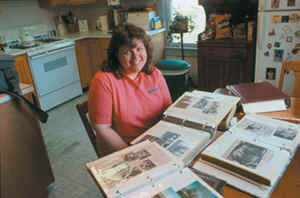
Joyce
Heflin Pearson pores over a pile of scrapbooks her mother put
together on the town of The Plains. Her mother was the town clerk
and was active in local politics. Pearson, a lifelong native of The
Plains, has followed in her footsteps. She is a new member of the
town council. |
A strong sense
of community holds The Plains together. Fourth-generation resident Joyce
Heflin Pearson says the town has never lost its close-knit feel, despite the
development pressure it and many surrounding communities have felt.
�The Plains is little clans of families that have
been here for a long time,� she says. �As the kids grew up, they built a
house next door and stayed.�
Pearson�s great-grandfather was a carpenter who built
many of the buildings in town, including the home in which she now lives.
Like most of the residents of The Plains, she knows just about everyone in
town.
�We have a neighborhood watch, but it�s not like
others,� she jokes. �The neighbors watch everything. If you have a
party, the neighbors are watching.�
Pearson says
it�s always been that way. Neighbors still know and care for each other.
It�s that kind of environment that has made The Plains attractive to some
of the town�s relative newcomers � the artists and other people who now
love the town as much as the old-timers.
|
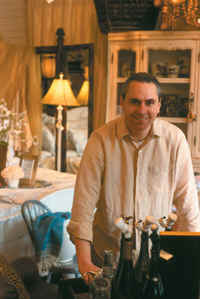
Kenny
Sherman and his wife, Peyton, own "Peyton Place," a shop
in which to find unusual gift and home-decorating ideas. |
Kenny
Sherman remembers how the town reached out to him and his wife when the
farmhouse they were renting in The Plains burned to the ground just two
years after they had moved there from Los Angeles.
�We lost everything, including our two dogs,� he
recalls. �But when the volunteer firemen came to our house, they were
people that we knew, and it was wonderful.�
Other townspeople collected clothing for the couple and
brought them food. Sherman said that kind of thing rarely happens in a big
city like L.A.
�We�ve discovered that living in a small community
like this, everyone takes care of you. It�s wonderful,� Sherman says.
�The Plains has been good to us.�
Sherman and his
wife, Peyton, run one of the most interesting stores in The Plains.
�Peyton�s Place,� as it is called, is a treat for the senses. It is a
collection of unusual home and gift items that you won�t find anyplace
else. The couple�s taste is rather cosmopolitan for a small town in
Virginia. Brazilian music plays as you enter the store, and there is a
distinct international flavor. Celebrating the different colors and textures
of the world, the merchandise reflects Peyton�s skill at searching out the
unusual and unexpected.
|
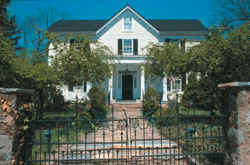
The
town of The Plains has classic homes of many different styles. |
Rita Fenwick is
another transplant who has found heaven in The Plains.
�The thing that attracted us here was having the best
of both worlds,� she says. �The country, with its slower pace, and the
proximity to the DC area.�
When Fenwick and her husband, George, moved to The
Plains nine years ago, they brought with them the organization they founded,
the American Bird Conservancy, and its 20 employees.
The organization specializes in bringing together other
conservation groups in ways that benefit birds. By coordinating numerous
groups with diverse interests in preserving the environment, they have had
many victories in improving habitats for birds.
The couple
moved its headquarters to The Plains from Washington, DC, and loves the town
for the same reason most do � the high quality of life.
�We get
teased and called �those bird people,� � Fenwick says with a laugh,
�but people are good to us here.�
So Many Interesting People
In a small workshop just a block off Main Street,
furniture maker and restorer Martin Robinson planes the cornice for a custom
cabinet he is making out of an ancient red oak tree that almost fell on his
customer�s house. As he shaves the piece into shape, he talks about
furniture-making techniques of centuries past, and of his luck at finding a
home for his business in The Plains.
�It�s the diversity of people here that I like,�
he says in a soft British accent. �Most of my customers are local. I do
have some rather famous clients, but I can�t tell you who they are,� he
laughs.
Robinson may be onto more of what makes The Plains
special than anything else. The town has an interesting mix of rich and
famous residents as well as ordinary folks. The presence of artists and
craftsmen seems to make it a comfortable place for other artists and
craftsmen. The camaraderie is strong.
Down the street, in an old school house, is Wolf
Instruments, world-renowned makers and restorers of vintage keyboard
instruments. The small company builds some of the world�s finest
harpsichords and historic pianos, played by virtuoso performers all over the
world.
Tom Wolf says he relocated his shop from Washington,
DC, to The Plains in search of a quieter lifestyle.
�It�s a very small community, and people make a
living doing odd and interesting things here � making wine, growing
vegetables,� he says. �An artist or craftsman fits right in.�
Right in the center of town is The Plains Pharmacy,
where you can find Toby Merchant, one of the town�s most well-known
businessmen. Merchant opened his pharmacy in The Plains in 1967. It is one
of the few pharmacies in Northern Virginia that still has a compounding lab
for making custom medications. He also owns a fleet of vans that deliver
medical equipment all over the region.
Merchant is pretty clear about what he thinks makes The
Plains popular:
�Once you come west of Bull Run Mountain, it�s a
totally different environment from what you see in Northern Virginia,� he
says. �You get good air, relaxation, a wonderful social environment, good
food and wine, and four-legged animals to enjoy. When you go back you feel
like you�ve been on a long trip.�
A Look Back
The Plains got its name because it reminded Colonial
settlers of the topography of White Plains, New York. There really are no
plains at all in The Plains. The area is more of a bowl between several
mountains that occasionally collects a white mist early in the morning, just
as does the town�s northern namesake.
For many years there was no town at all. The whole area
bore the name �The White Plains� of Virginia. By the time the town
sprang up and the first post office was established in 1831, the name had
been shortened to The Plains.
In its earliest days, The Plains was a farming
community. Wealthy landowners held tracts of land as big as several thousand
acres. You will still find many family names in the area that date back to
these original holdings. Likewise, because most of these farms had slaves,
there are many common family names among the area�s African-American
population.
�During the Civil War, The Plains was the southeast
corner of Col. Mosby�s territory,� says Marci Markey, a town historian.
Col. John S.
Mosby led a band of local Confederate soldiers called Mosby�s Raiders.
Because of his ability to hit Union supply lines and then disappear into the
countryside, he was given the nickname, �The Gray Ghost.�
�Mosby�s
last raid, after Lee surrendered, started from The Plains,� Markey says.
�They just hadn�t heard that the war was over yet.�
|
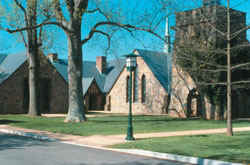
One
of the prettiest sights in town is the Grace Episcopal Church. Some
say that a ghost plays the pipe organ in the dark, stained-glass
adorned sanctuary. |
Markey and her
husband moved to The Plains 31 years ago and bought a house built in 1852.
Originally it had been a two-room tack shop where some say Col. Mosby got
some of his tack.
For history buffs, one of the treasures of The Plains
is the Afro-American Historical Association of Fauquier County. This
non-profit organization operates a wonderful museum, and maintains an
extensive repository of genealogical data for people who want to trace their
family history.
�Most black families in the area knew their genealogy
by oral history,� says Jane Butler, who is in charge of the
association�s family research. �They didn�t have it substantiated by
records. I try to back it up with documents from the Fauquier County
Courthouse and other sources.�
The association�s museum nicely parallels local black
history with what was happening nationally. It contains interesting
artifacts, written documents and photographs that tell the story of
Fauquier�s black residents.
The Plains of Tomorrow
Marci Markey says The Plains is comfortable with
itself, as it shifts toward being an arts community. She thinks that will
help it keep its small-town charm. She points out that in the three decades
she�s lived there she can only count a couple of new buildings which have
been erected. So close to the DC area, one might wonder how the town has
been able to limit development. Markey smiles and says, �Land trusts.�
No matter which direction you go as you leave The
Plains, you pass rolling fields and pastures. Markey says this is not by
accident. Landowners on the fringes of town have placed their land in trusts
that hopefully will prevent future development. Few towns are able to do
this, she notes. Town residents hope that for future generations those
fields will remain, protecting the town from the westward push of
Washington, DC, sprawl.
When not studying history, Markey is an accomplished
seamstress for women who want custom wedding gowns or period dresses.
�Once I sewed a beautiful Victorian wedding gown with
a seven-foot train and 4,000 beads,� she says proudly. �You just have to
know what you want.�
When it comes to a community, the residents of The
Plains know exactly what they want. They�d like to keep their town exactly
as it is, and share it with visitors who are looking to escape for a while.